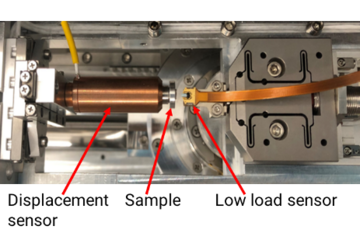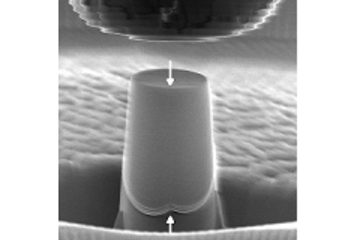All genres
221.
Talk
Einheitliche Beschreibung dynamischer und statischer Erholung von Stufenversetzungen mittels Dipolweitenverteilungen. Seminar of the Institute of Materials Physics, University of Vienna, Vienna, Austria (2003)
222.
Poster
Boundary Layer Formation in Continuum Dislocation Dynamics. Dislocations 2016, Purdue University, West Lafayette, IN, USA (2016)
223.
Poster
Spherical indentation and crystal plasticity modeling near grain boundaries in alpha-Ti. Indentation 2014, Strasbourg, France (2014)
224.
Poster
A MATLAB Graphical User Interface to analyze slip transfer through grain boundaries. MSE2014, Darmstadt, Germany (2014)
225.
Poster
Identification of the Critical Resolved Shear Stress Ratios of the Deformation Systems and Investigation of Slip Transfer in Ti–5Al–2.5Sn alloy. CAMTEC 2014, Cambridge, UK (2014)
226.
Poster
Numerically robust spectral methods for crystal plasticity simulations of heterogeneous materials. Materials to Innovate Industry and Society, Noordwijkerhout, The Netherlands (2013)
227.
Poster
Stress and Strain Partitioning in Dual Phase Steels: Statistical Analysis of Numerical Results. Materials to Innovate Industry and Society, Noordwijkerhout, The Netherlands (2012)
228.
Poster
Heterogeneous Crystal Plasticity Simulations Using Pseudo-Spectral Methods. Materials to Innovate Industry and Society, Noordwijkerhout, The Netherlands (2012)
229.
Poster
Using a "Virtual Laboratory" to Derive Mechanical Properties of Complex Microstructures. 11th GAMM-Seminar on Microstructures, Essen, Germany (2012)
230.
Poster
Using a "Virtual Laboratory" to Derive Mechanical Properties of Complex Microstructures. Materials to Innovate Industry and Society, Noordwijkerhout, The Netherlands (2011)
231.
Poster
Signed dislocation densities and their spatial gradients as basis for a nonlocal crystal plasticity model. MMM 2010 Fifth International Conference Multiscale Materials Modeling, Freiburg, Germany (2010)
232.
Poster
A Non-Local Dislocation Density Based Constitutive Model for Crystal Plasticity. Junior Euromat 2010, Lausanne, Switzerland (2010)
233.
Teaching
Advanced Constitutive Models for Crystal Plasticity Simulations - Fundamentals, Implementation, Application. Lecture: Winter School 2014, Research Training Group 1483, KIT, Karlsruhe, Germany, March 18, 2014
234.
Teaching
Understanding the Elasto-Plasticity of Crystals. Lecture: MMM- Max-Planck Multiscale Simulation Conference, St. Feliu de Guixols [Spain], October 30, 2007
235.
Teaching
Crystal mechanics and recrystalliation models: Simulation for industry. Lecture: Internal Industry Conference, MPI für Eisenforschung GmbH, Düsseldorf, Germany
236.
Thesis - PhD
On the role of dislocation dipoles in unidirectional deformation of crystals. Dissertation, Friedrich-Alexander Universität Erlangen-Nürnberg, Erlangen (2004)











